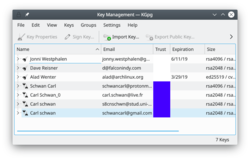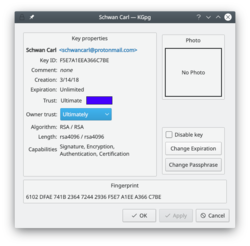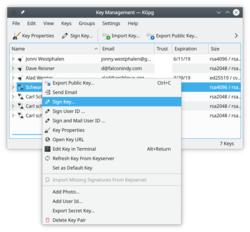KGpg: Difference between revisions
Added Special:myLanguage, removed double indentation and emphasis on links |
No edit summary |
||
| Line 17: | Line 17: | ||
<!--T:4--> | <!--T:4--> | ||
:{{Tip|When you start '''KGpg''' with default settings it will hide in the system tray. If you started '''KGpg''' and do not see it anywhere you can probably reach it when you expand the [[Special:myLanguage/Plasma|Plasma]] system tray widget.}} | :{{Tip|When you start '''KGpg''' with default settings it will hide in the system tray. If you started '''KGpg''' and do not see it anywhere you can probably reach it when you expand the [[Special:myLanguage/Plasma|Plasma]] system tray widget.}} | ||
:{{Tip|1=If a contact has more than one key - perhaps some old keys in addition to the current one - and the wrong key is being used for encryption, find the old keys and reduced their Trust status to Not Trusted. They will remain available for decrypting old messages, but not used for new ones. }} | |||
<!--T:5--> | <!--T:5--> | ||
Revision as of 14:36, 30 May 2011
 |
KGpg provides a graphical interface to gpg's commands |
GnuPG encrypts and decrypts your mail and selected files. There are many command-line options to achieve this. With KGpg the anxiety is removed - you don't have to remember any commands. KGpg can help you set up and manage your keys, import and export keys, view key signatures, trust status and expiry dates. In fact just about everything you need to do is covered by KGpg. A wizard is provided to help you set up your keys.
KGpg is integrated into Konqueror and Dolphin, where a context menu allows you to choose to encrypt a file, with or without signing.
 |
 |

Tip

Tip
A full illustrated manual helps you through every detail.
If you are not in a position to physically verify the identity of your contacts you should especially read the key-signing section which explains the benefits of local-signing.
